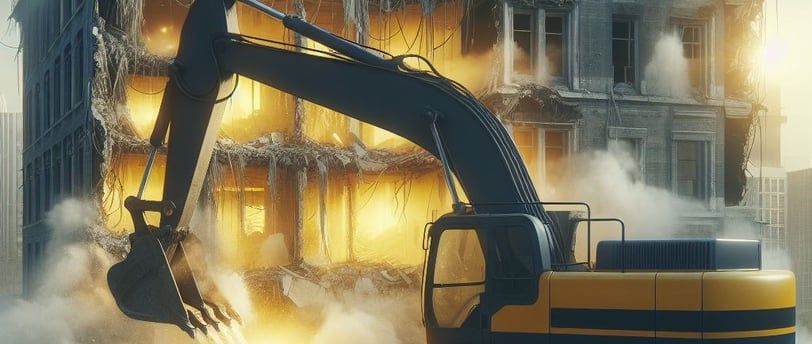Demo of existing Structure
NEW CONSTRUCTION
7/16/20233 min read


Demolishing and Rebuilding a House by the City of Winnipeg Local Bylaws
When it comes to demolishing and rebuilding a house, it is essential to follow the regulations set by the City of Winnipeg's local bylaws. These bylaws ensure that the process is carried out safely, efficiently, and in compliance with the city's guidelines. This can be done online through the City of Winnipeg's Permit Online System, or in person at the City's Planning, Property, and Development Department (https://www.winnipeg.ca/permitsonline/):
The application process typically involves submitting documents like:
A completed demolition permit application form
Detailed house plans showing the pre- and post-demolition state (prepared by a registered architect or technologist)
A site plan with property lines, setbacks, utility locations, and access points
An asbestos testing report for the house materials (if required)
Demolition Contractor:
Winnipeg has many professional demolition companies. It's wise to:
Get quotes from several contractors and inquire about their past project experience and relevant licenses/certifications.
Ensure the chosen company has experience demolishing houses and can handle the safe and legal disposal of demolition debris.
Demolition Process:
The demolition itself should be conducted by qualified professionals following all safety regulations.
Demolition can generate noise, dust, and debris, so informing neighbors and taking dust mitigation measures are important.
The resulting debris needs to be disposed of according to regulations, usually transported to a licensed landfill site.
Demolition Cost:
Demolition costs can vary depending on factors like house size, building materials, presence (and potential removal) of asbestos, and the overall complexity of the project.
Getting quotes from multiple demolition companies allows for a better cost comparison.
Additional Considerations:
Foundation: Decide whether to remove the entire foundation or just the superstructure. Removing the foundation is more expensive but allows for a completely fresh start.
Additional Permits: Demolishing a house might require additional permits, such as those for disconnecting utilities.
Future Plans: Have a clear vision for your property after demolition. Will it be a vacant lot for future development, or will you build a new house?
Obtaining a demolition permit might seem like an extra step, but it's an important one. By following the proper procedures, you can ensure your demolition project is safe and responsible and minimizes disruption to your community. Remember, a little planning goes a long way in ensuring a smooth and successful demolition process.
What Information Do You Need to Provide?
The specific information required for a demolition permit can vary by city, but here are some general things you might need to submit:
Project Details: This includes the address of the property, a description of the structure to be demolished (size, materials), and the proposed demolition method.
Site Plans: Provide drawings or sketches showing the location of the structure and surrounding buildings.
Debris Removal Plan: Outline your plan for disposing of the demolition debris responsibly.
Safety Measures: Depending on the size and complexity of the demolition, you might need to detail safety measures to protect workers and the public.
Contractors and Licenses: If you're hiring a demolition contractor, you'll need to provide their license information.
Why Does the City Require a Permit?
Demolition projects can pose safety hazards if not done properly. Permits help the city ensure:
Worker Safety: Demolition work can be dangerous. Permits ensure proper safety protocols are followed to protect workers from falling debris, hazardous materials, and other risks.
Public Safety: Demolition can impact nearby structures and pedestrians. Permits help minimize risks to the public by requiring proper planning and safety measures.
Environmental Protection: Demolition debris can contain hazardous materials like asbestos or lead. Permits ensure proper handling and disposal of these materials to protect the environment.
Structural Integrity of Surrounding Buildings: Demolition needs to be done carefully to avoid damaging nearby structures. Permits help ensure the demolition is planned and executed responsibly.
What Structures Need a Permit?
Generally, any permanent structure requires a demolition permit. This includes:
Houses and other residential buildings
Garages and sheds
Commercial buildings
Industrial structures
Pools
Exceptions Might Exist:
Some cities might have exceptions for very small structures, like small sheds or carports. However, it's always best to check with your local building department to be sure.
